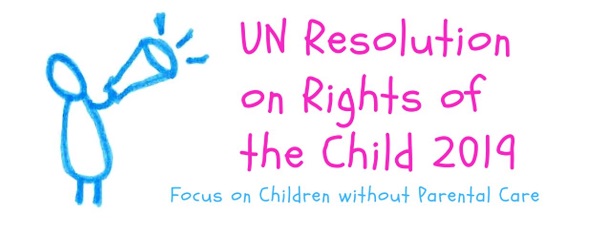UN Adopts Rights of the Child Resolution

The UN General Assembly adopts Rights of the Child resolution with milestone commitments for children without parental care
On November 18, 2019, the UN General Assembly’s Third Committee finalised negotiations and adopted its annual resolution on the Rights of the Child (A/RES/74/21). This year, the resolution focuses on children without parental care – one of the world’s most vulnerable populations.
“Through this international agreement, governments from all around the world recognize the grave situation in which many children grow up, with their rights violated and the development of their full potential compromised. But most importantly, they lay out a set of solutions and commitments to put into place the mechanisms, investments and systems to fulfill and protect the rights and meet the protection needs of children without parental care,” said SOS Children’s Villages Representative to the United Nations, Sofia Garcia Garcia.
In the resolution, UN member states express concern about the particular vulnerability of millions of children around the globe due to the lack of both adequate support for families at risk and a range of quality care options for children who have lost parental care. The resolution also outlines a series of actions and commitments to improve the situation and fulfill the rights of this group of children.
“SOS Children’s Villages Canada welcomes the new UN resolution on the Rights of the Child as an important milestone for the care and protection of children without parental care and those at risk of losing it,” said Thomas Bauer, SOS Children’s Villages Canada President and CEO.

Member states reaffirm their commitment to implement key systemic actions such as training for authorities who work with children using the Guidelines for the Alternative Care of Children. They call out for improved data collection to inform policies and programming for this group of children. They also recognize that a range of quality care options is needed in order to meet the principles of necessity and suitability of care placement and to avoid institutionalization, ensuring that every child can be provided with an individualized care solution in his or her best interest.
In addition to the language adopted in the resolution, member states reaffirmed key international human and child rights documents such as the UN Convention on the Rights of the Child, the UN Convention on the Rights of Persons with Disabilities and the Guidelines for the Alternative Care of Children.
SOS Children’s Villages is pleased to see the recognition that multiple vulnerabilities often intersect to cause family separation and values the commitment to take a holistic approach to ensuring the fulfilment and protection of the rights of every child. A series of actions towards strengthening parents’ ability to take care of their children and improve the economic and social situation of families is a welcome focus of the resolution as it will ensure that alternative care is always a measure of last resort.
Through its presence in 136 countries and territories and with its 70 years of experience serving children without parental care, SOS Children’s Villages stands ready to support the UN and its member states in implementing this resolution in the coming years and looks forward to their continued commitment, in both words and actions, to protect the rights of children without parental care.
Canadians wishing to help vulnerable children are encouraged to sponsor a child, sponsor a Village or make a one-time donation. Your support will change the lives of orphaned, abandoned and other vulnerable children. Please help today.
